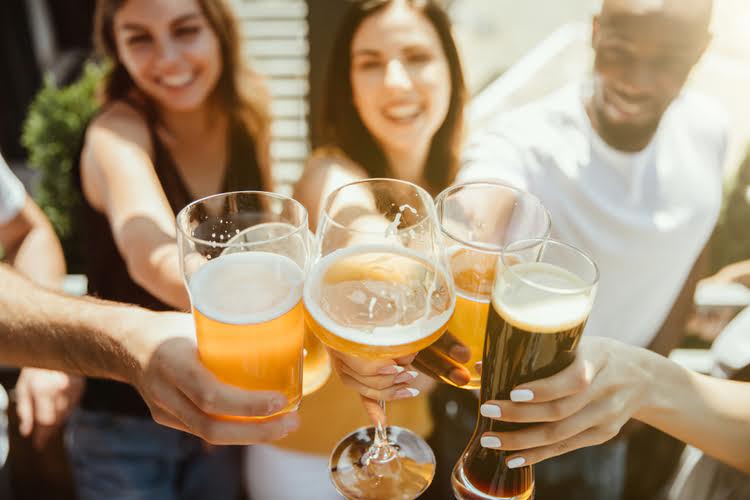“If I’m going to choose between drinking a $22 drink or paying rent, I’m probably gonna pay rent,” she explained. Please share this blog post with anyone who might find it helpful, or contact us today to learn more about how we can assist you in your journey toward better health and well-being. Once you remove alcohol, those mornings of regret and overanalyzing disappear. No more waking up in a panic, no more piecing together foggy memories, no more wondering why you feel on edge for no reason. Heart disease is still the top cause of death — but with proven tools in hand, we all have the power to change that.
Find alternatives you love
Here’s a deep dive into what’s behind the trend and what the “sober curious” movement really encompasses. It’s a shift in the way people and generations are interacting with and thinking about alcohol use. The movement refers to individuals becoming more mindful of their alcohol consumption without necessarily committing to complete abstinence. It’s about questioning the role of alcohol in one’s life and exploring a healthier relationship Alcohol Use Disorder with drinking.
Alcohol Trends During Year 1 of the Pandemic

One study found that after being sober for one month, people experience decreases in blood pressure and a lower risk for alcohol-related conditions. Gen Z’s replacement for alcohol is not just soda or juice—it’s functional beverages. These include adaptogen-infused teas, CBD seltzers, mushroom coffees, and nootropic tonics that promise both social and physiological benefits. This generation wants drinks that help with relaxation, gut health, or focus—not ones that deplete them. Gen Z is more open than older generations about mental health struggles, from anxiety to depression. They notice how alcohol worsens symptoms—either https://zkus.mupyonline.cz/blog/2025/01/20/how-to-know-if-you-or-a-loved-one-are-addicted-to/ in the moment or during hangovers.
You Have a Mental Health Condition
Sober curious is a term that means questioning your relationship with alcohol and thinking about trying sobriety, even if you are not ready to commit to it. One of the biggest fears about cutting back is losing joy in social life. But as Gen Z demonstrates, fun doesn’t have to come from alcohol—it can come from connection, creativity, and presence. For Gen Z, social media doesn’t just reflect habits—it actively reshapes norms around alcohol. The concept of “hangxiety”—hangover-induced anxiety—went viral, with Gen Z sharing videos of lost productivity, poor skin, and emotional fallout. This “real talk” digital storytelling discourages alcohol use by highlighting short- and long-term costs.
You’ll Start Sleeping Better At Night

A 2014 study from the College of Family Physicians of Canada does not recommend drinking nonalcoholic or alcohol-free versions of alcoholic drinks for new or expectant mothers. As noted, nonalcoholic drinks can still contain as much as .5% alcohol by volume. The Centers for Disease Control recommends no alcohol use at all when women are pregnant. The notion of alcohol as a social lubricant has long been the norm — ask the designated driver at any event. However, in recent years, there’s been a growing awareness of the health implications of alcohol consumption and a cultural shift toward non-alcoholic beverages. If the sober curious journey has inspired you to reevaluate your relationship sober curious with alcohol, it’s important to remember that support is available.
How to socialise when you’re sober curious
- Many people reach for a drink to unwind, but alcohol is a depressant that can actually disrupt the delicate balance of chemicals in your brain.
- To protect yourself from developing dependence, you can start paying closer attention to when and how much you drink.
- Describing the reasons for this planned decline, 47 percent said they wanted to do it for their physical health, 32 percent to live longer, 24 percent to lose weight and 23 percent for their mental health.
- Rather, it involves considering drinking less – and in some cases, not at all – and deciding to fit alcohol into your life more thoughtfully instead of mindlessly participating in drinking culture out of habit.
- Treatment can reduce your risk of experiencing dangerous alcohol withdrawal symptoms and provide a safe space to explore sobriety.
When you’re sober curious, you realize you don’t need alcohol to unwind after a long day or to make an event enjoyable. You start to see that the “magic” of alcohol was never about the drink itself—it was about the people, the atmosphere, and the way you chose to experience life. One of the most significant cultural changes among younger generations is the reduced stigma around mental health.